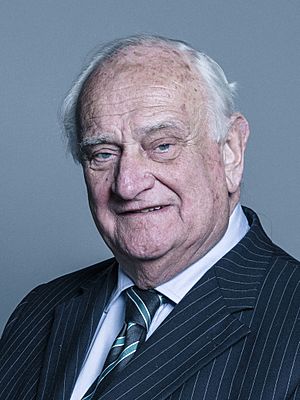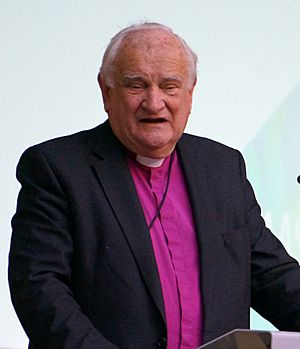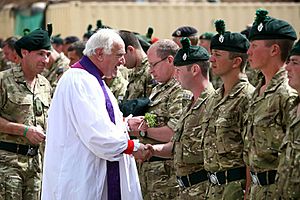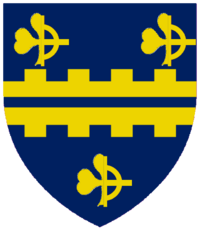Robin Eames facts for kids
Quick facts for kids The Most Reverend and Right Honourable The Lord Eames OM |
|
|---|---|
| Archbishop of Armagh Primate of All Ireland |
|
 |
|
| Church | Church of Ireland |
| Province | Armagh |
| Diocese | Armagh |
| In Office | 1986–2006 |
| Predecessor | John Armstrong |
| Successor | Alan Harper |
| Orders | |
| Ordination | 1963 |
| Consecration | 9 June 1975 by George Simms |
| Personal details | |
| Birth name | Robert Henry Alexander Eames |
| Born | 27 April 1936 Belfast, Northern Ireland |
| Nationality | British |
| Denomination | Anglican |
| Spouse |
Christine Daly
(m. 1966) |
| Previous post | Bishop of Derry and Raphoe (1975–1980) Bishop of Down and Dromore (1980–1986) |
| Alma mater | Queen's University Belfast |
Robert Henry Alexander Eames, also known as Baron Eames, was an important leader in the Church of Ireland. He was an Anglican bishop who served as the top leader, called the Primate of All Ireland and Archbishop of Armagh, for 20 years, from 1986 to 2006. He was born on April 27, 1936.
Contents
Early Life and Schooling
Robert Eames was born in 1936. His father was a Methodist minister. Robert spent his early years in Larne, a town in Northern Ireland. Later, his family moved to Belfast.
He went to school at Belfast Royal Academy and Methodist College Belfast. After that, he studied at Queen's University Belfast. He earned a law degree in 1960. He also got a Ph.D. in church law and history in 1963.
While at Queen's University, one of his teachers was Cahal Daly. He later became a leader in the Roman Catholic Church.
His Work as a Church Leader
Even though he studied law, Robert Eames decided to become a church minister. In 1960, he began studying at Trinity College, Dublin. In 1963, he became a curate assistant at Bangor Parish Church. Three years later, he became the rector (main minister) of St Dorothea's in Belfast.
In 1966, he married Christine Daly. While working at St Dorothea's, he started a "coffee bar ministry" for young people. This was a way to connect with them. During this time, Northern Ireland faced a period of conflict called The Troubles. He once helped a Catholic girl escape from a group of people who had set her family's home on fire.
In 1975, when he was 38, he was chosen to be the bishop of the Diocese of Derry and Raphoe. This diocese covers areas in both Northern Ireland and the Republic of Ireland. He invited Edward Daly, a young Catholic bishop, to his special ceremony. This was a big step towards better relations between different churches.
Five years later, in 1980, he became the bishop of the Diocese of Down and Dromore. In 1986, he was chosen to be the 14th Archbishop of Armagh. This made him the Primate of All Ireland for the Church of Ireland. This was a very important role.
Helping the Anglican Church
Lord Eames was a very important person in the wider Anglican Communion. This is a worldwide family of Anglican churches. He was often called a "troubleshooter" because he helped solve difficult problems.
- He led a group that looked at women becoming bishops in 1988–89.
- He also led a group that studied church teachings in 1991.
- From 2003 to 2004, he led the Lambeth Commission on Communion. This group looked at big challenges to keeping the Anglican Communion united.
The Commission released its report, known as "the Windsor Report", in October 2004. This report helped guide the Anglican Communion through its challenges.
Retirement and Successor
In 2006, Lord Eames announced that he would retire on December 31, 2006. He was 69 years old and in good health. Church rules would have allowed him to stay until he was 75. A newspaper article said that even with his warm smile, he was a very strong person.
On January 10, 2007, the bishops of the Church of Ireland met. They chose Alan Harper to be the new Archbishop of Armagh.
Working for Peace in Northern Ireland
In 2007, Lord Eames became a co-chairman of the Consultative Group on the Past. This group worked to figure out how to deal with the lasting effects of The Troubles in Northern Ireland. They especially focused on helping victims and their families.
The group released its report in January 2009. It aimed to help people understand and move forward from the difficult past.
Awards and Special Recognitions
Lord Eames received many honors and awards for his work.
- In 1987, he was a special speaker at Oxford University.
- In 1995, he was made a life peer. This means he became Baron Eames and could sit in the House of Lords in the UK Parliament. He sat as a crossbencher, meaning he did not belong to a specific political party.
- He received many honorary doctorates from different universities. These degrees recognized his important contributions.
- In 1998, he became an honorary Bencher of Lincoln's Inn in London.
- In 2006, he received the Archbishop of Canterbury's Award for Outstanding Service to the Anglican Communion. This is a very special award.
- He also received the Tipperary International Peace Award in 2006.
- In 2007, Elizabeth II gave him the Order of Merit. This is a very exclusive award, given to only 24 people at a time. It is a personal gift from the monarch.
- In 2007, he was given the Freedom of the City of Armagh.
|
See also
- List of Life Peerages
- List of Northern Ireland Members of the House of Lords
 | Leon Lynch |
 | Milton P. Webster |
 | Ferdinand Smith |





